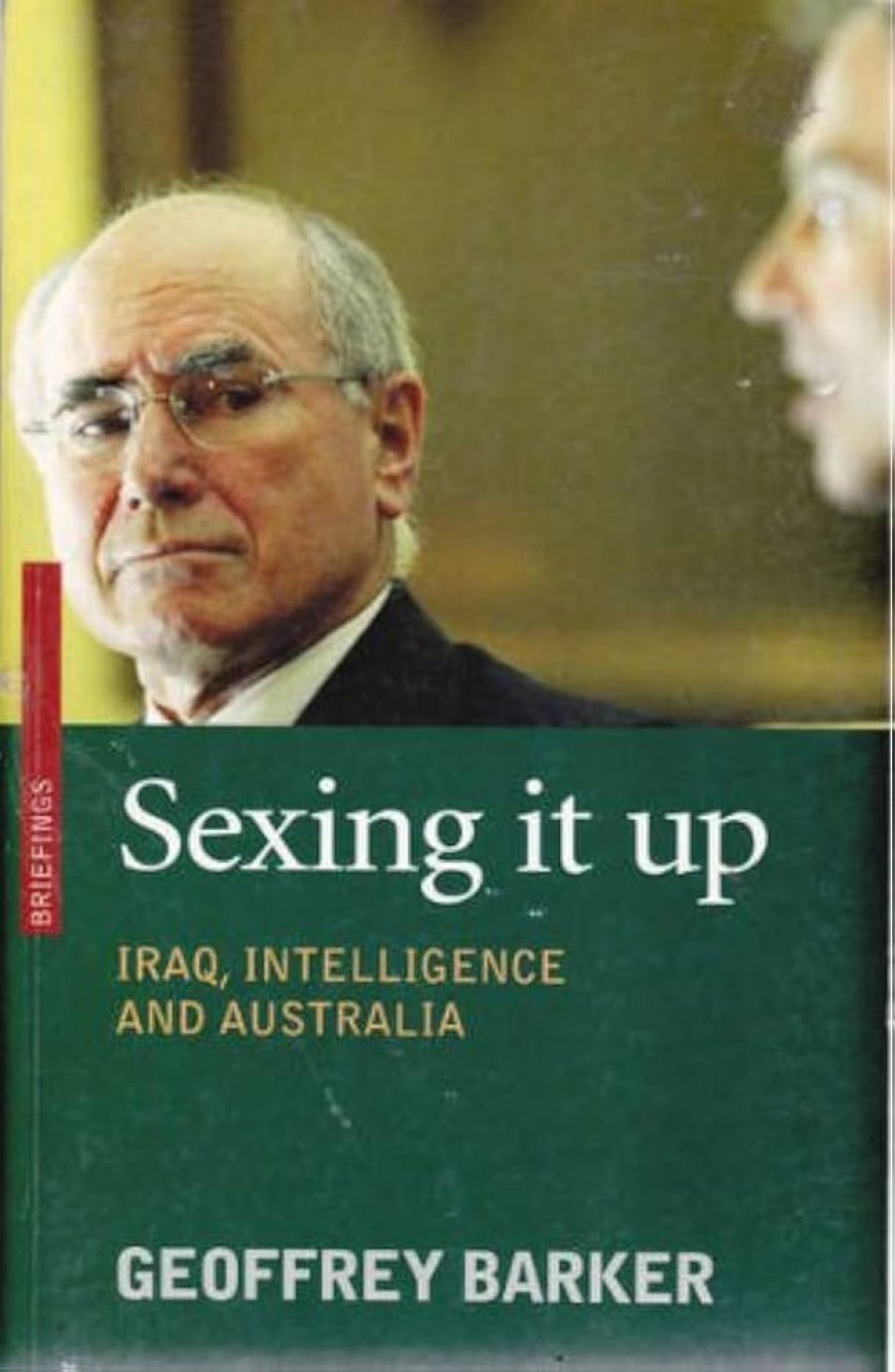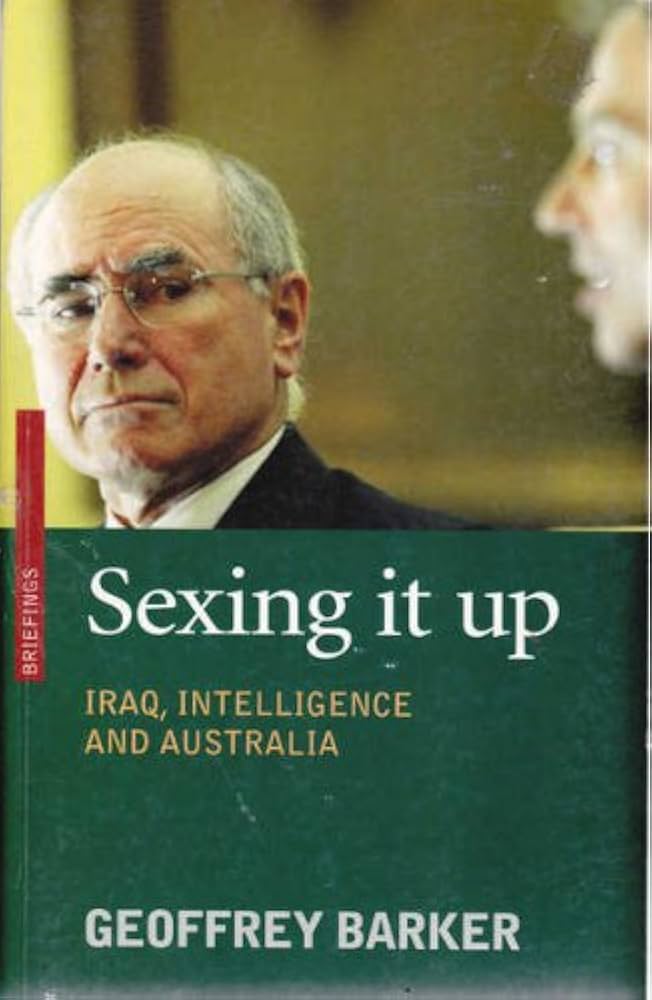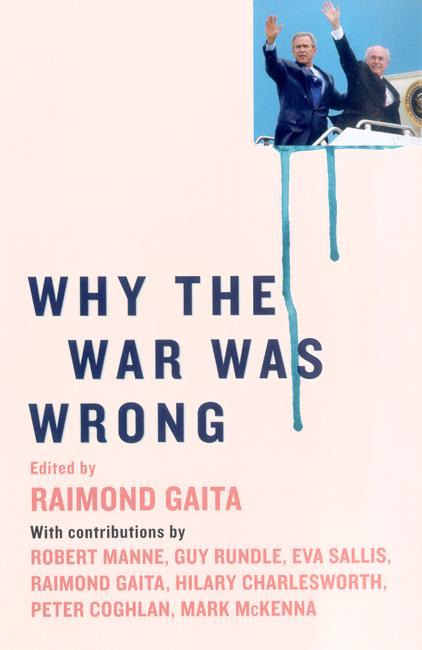
- Free Article: No
- Contents Category: Politics
- Review Article: Yes
- Article Title: War Rhetoric
- Online Only: No
- Custom Highlight Text:
Like several other publishers, UNSW Press and Text Publishing have produced responses to the recent war against Iraq. The intention appears to be to engage critically with popular perceptions of the war before these harden into accepted historical ‘memory’. The potential benefits of quickly produced, historically aware and politically critical books, which collate and deal comprehensively with the existing evidence and arguments raised by the mass media on a particular issue, are obvious. The two main dangers with publications of this type are that editing and production standards may slip and that the desire to compete with mass-media forms may lead to a replication of, rather than an alternative to, standard journalistic commentary.
- Book 1 Title: Sexing It Up
- Book 1 Subtitle: Iraq, intelligence and Australia
- Book 1 Biblio: UNSW Press, $16.95pb, 112pp
- Book 1 Cover Small (400 x 600):

- Book 1 Cover (800 x 1200):

- Book 2 Title: Why the War was Wrong
- Book 2 Biblio: Text, $23pb, 208pp
- Book 2 Cover Small (400 x 600):

- Book 2 Cover (800 x 1200):

Barker is concerned with the process by which Australian, British and US governments ‘sexed up’ information provided to them by their various intelligence agencies, in order to convince their respective electorates that the invasion of Iraq was necessary for security reasons. The plan to invade Iraq, he notes, pre-dated the terrorist attacks of September 11 and the ‘discovery’ or any new threat posed by Iraq. In their desire to support the US, the Blair and Howard governments uncritically accepted the advice of the Bush administration and its intelligence agencies. Alfer the war, when this advice was revealed to be wildly inaccurate, Bush, Blair, Howard and their spokespeople variously claimed that they were not informed of the doubts of the intelligence community, sought to deny and discredit claims by members of that community that these doubts were passed on, and found new and markedly noble reasons for why the strike on Iraq was necessary, especially that of liberating the Iraqi people.
Barker’s arguments about the real reasons for the war in Iraq and the role of government spin in promoting public support for the war seem logical. But in the end, he hasn’t said very much. As his claims are directly based on statements and documents already in the public sphere, his work cannot be said to have proven them. The facts he presents didn’t really need proving, since they were already available. In an age of ‘spin’ and when news does not remain in the public consciousness for long, this is a valuable exercise, but it would have been more useful for Barker to take the established facts as starting points for a consideration of more interesting lines of inquiry: why have these governments placed such emphasis on spin, and why has this style of politics been so successful, even when, as in Australia, the public apparently believes that Howard lied to them?
Gaita’s collection of essays, in contrast, starts from assumptions that Barker has been at pains to ‘prove’: the Australian government lied to its people about its plans to go to war and its motives for doing so; for this and other reasons, the war was wrong. ‘All of us,’ writes Gaita in his introduction, ‘are glad that Saddam’s criminal government has fallen ... None of us believes that the war was a just means’ to that achievement. Gaita’s clear stance is evidence not of dogmatism but of a valuable capacity to grasp issues and to make moral and political judgments.
Robert Manne argues that the war was wrong because it was conducted at the behest, and in the political interests, of a group of people with a profound desire to impose their will, and their vision of an appropriate form of society, on others: ‘Any attempt at an explanation of the invasion of Iraq must begin ... with ideology, with the influence of neo-conservatism, the most powerful ideological stream in American political life at the present time.’ Manne identifies the key individuals, groups, organisations and publications of American neo-conservatism, draws links between their political and religious fundamentalism, and traces the personal connections between this group and George W. Bush.
Hilary Charlesworth provides a concise and convincing account of the relevant legal issues, demonstrating clearly the spurious nature of US, British and Australian government claims to possess a legal basis for their attack.
Eva Sallis asks her readers to empathise with humanity and to reconsider the dehumanising nature of much reporting or war deaths: ‘We cannot easily look for the meaning of mass killing, whether it is 7376, hundreds of thousands, or millions, without returning to the meaning of taking one life.’
Through his characteristically relentless logic, based on high-minded but generally irrefutable moral principles, Gaita demonstrates the absence of a moral basis for this war and the hypocrisy of those (many of them professed Christians) who supported it: ‘Two and a half thousand years after Socrates our leaders urge us, in tones of high moral earnestness, always to be ready to do evil to our enemies before they have much chance of making us suffer it.’
Peter Coghlan offers a careful discussion of the reasons for and against invading Iraq. Any humanitarian motives of the United States, Coghlan finds, are irredeemably corrupted by an insistence that Iraq be remade in its own image.
Guy Rundle argues that ‘the key political and historical factor in the character of the new era is ... the development of weapons of mass destruction’. He suggests, accordingly, the need for those on the political left to rethink their traditionally oppositional stance towards the powerful: ‘The task of primary importance is to move towards a “multilateral” situation ... in which the control of [weapons of mass destruction] is managed by representatives of the whole of humanity.’
The potential of the current affairs book is best realised by Mark McKenna, who suggests that Howard’s personal history and familial culture predisposed him to view war as a great and noble venture, and made him likely to define his own contribution to public life in terms of his contribution to military conflict. In Howard’s mind, Australianness is defined by the Anzac sacrifice, and the ensuing ‘great (military) tradition’. He has referred to this tradition over and over again at the many farewells and welcome-home ceremonies he has insisted on staging for Australian troops. For Howard, in his ubiquitous speeches at these occasions, all troops become Anzacs and thus equally worthy of universal respect and pride, regardless of the justness or otherwise of the war they will take part in or have just returned from. By ‘wrapping himself in khaki’, and dismissing any criticism of military operations as ungrateful and un-Australian, Howard has similarly positioned himself as both the ‘friend’ of the Anzac and the true inheritor of the true Australian tradition. ‘At the dawn service held in Gallipoli in 2000,’ for example, ‘Howard’s minders distributed to the press photographs of his father and grandfather, both of whom had fought in World War I.’
One of the ways Howard has sought to defend his political position has been through his oft-repeated determination that soldiers returning to Australia should never again receive the treatment handed out to Vietnam veterans. These statements coincided with the shift in his professed reasons for sending Australia to war, from attacking a potential aggressor to liberating an oppressed people. But, McKenna writes: ‘Between 1966 and 1970 there were more than sixteen welcome-home parades for soldiers returning from Vietnam, all of them attracting thousands of cheering onlookers.’ Howard would have known this. On his campus, he was a vocal supporter of the war, having been voted Young Liberal President in 1964. But ‘peddling bad history’ became the means by which he could undermine criticism of the war in Iraq and his role in it.
Clearly, the mainstream media is not in a position to engage critically or at length with the increasingly sophisticated public-relations and poll-driven rhetoric of politicians. The need for carefully researched, politically critical and analytically sophisticated publications is hard to overestimate.


Comments powered by CComment